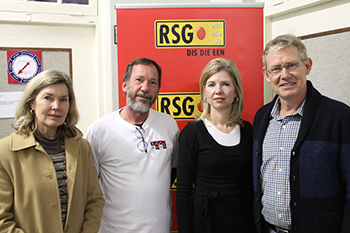Latest News Archive
Please select Category, Year, and then Month to display items
12 January 2024
|
Story Nonsindiswe Qwabe
|
Photo Sonia Small
 Since joining the UFS in 2008, Dr Grey Magaiza has worked extensively on approaches that can foster the socio-economic transformation of societies.
Since joining the UFS in 2008, Dr Grey Magaiza has worked extensively on approaches that can foster the socio-economic transformation of societies.
“The future should be one where communities can decide on their development agenda and futures. That’s the most important for me.” Dr Grey Magaiza, Deputy Director of the Centre for Gender and Africa Studies (CGAS) and Head of the Community Development programme on the Qwaqwa Campus, is passionate about capacitating communities to be agents of change and advancement. His vision for the future emphasises the empowerment of communities to take charge of their development by actively participating in decision making and the implementation of development projects that can improve their lives.
Since joining the UFS in 2008, Dr Magaiza has worked extensively on approaches that can foster the socio-economic transformation of societies. Over the years, he has crafted his research speciality into one that he is most proud of – being an interdisciplinary scientist immersed in the development of communities.
“I’m in a fortunate position of researching what I like. I say ‘fortunate’, because I’ve taken the time to understand what I’m passionate about, which is the overall field of rural livelihoods and livelihood futures – in short, community development. My research starts from an engaged university, understanding the elements that a university must use to enhance transformation and relevance to its immediate community in terms of development.”
One of the ways he has done this is by looking at social entrepreneurship as a development approach for young people in a rural setting. Through workshops with non-profit and civic organisations in Qwaqwa, Dr Magaiza has been helping these organisations to map out their needs and actively meet them through the involvement and support of external role players.
“We understand that communities are part of the national development agenda, but even that national agenda respects community knowledge and intentions and allows communities to shape their identity. A critical enabler of this is community organising. You bring back the capacity in communities to have dialogues on issues affecting them as spaces for engagement, knowledge exchange, and for people to just talk about their way forward.”
By enabling communities to define their development agenda, they can address their specific needs, challenges, and aspirations, he said. “When I look at livelihood futures, it’s quite an exciting aspect of my work – it’s like looking into a fortune tellers’ globe, because you’re not deciding for communities what they should do, but the communities themselves take those decisions.”
RSG Crossword Tournament helps to celebrate language
2016-07-27

Dr Annette de Wet (left), Assistant Director
of the Unit for Language Development in
the Centre for Teaching and Learning at
the UFS, Albe Grobbelaar from XWord,
Prof Angelique van Niekerk, Head of the
Department of Afrikaans and Dutch, German
and French, and Prof Lucius Botes, Dean of the
Faculty of the Humanities, during the launch
of the RSG Crossword Tournament.
Photo: Jóhann Thormählen
Sometimes it is difficult for language departments to be topical and to show their relevance for the people out there. However, with the RSG Crossword Tournament, this became possible and Afrikaans could be celebrated in a positive manner. This is what Prof Angelique van Niekerk, Head of the Department of Afrikaans and Dutch, German and French at the University of the Free State (UFS), had to say about this initiative.
Interest during the Vrystaat Arts Festival exceeded all expectations. Altogether, 46 participants from across the country participated on 15 and 16 July 2016. Ilse van Hemert from Pretoria was crowned as the first South African crossword champion.
New dimension to language milieu
Prof Van Niekerk said people are familiar with crossword puzzles from the media, and it was the first time that a tournament like this was presented to the public in South Africa. “This tournament brings something like linguistics and linguistic sensitivity to the fore,” she said. “It is another dimension of the language milieu.” This is exactly why her department would like to see it grow in future.
Wordplay serves as inspiration
The idea for the tournament is based loosely on the film, Wordplay (2006), which is set in New York, and the annual New York Times Crossword Tournament. The South African Tournament was presented in conjunction with the crossword group, XWord, Prof Van Niekerk’s department, and the radio station RSG as brand sponsor.
Crossword puzzles and blockbusters crosswords completed
“This tournament brings something like
linguistics and linguistic sensitivity to
the fore.”
Albe Grobbelaar from XWord said the winners were determined on a points basis. “Competitors had to complete two crossword puzzles and one blockbuster crossword. The difference between the two is that a blockbuster’s clues are within the blocks or grid, but with the crossword, you have white and black blocks with the clues separate on the outside.”